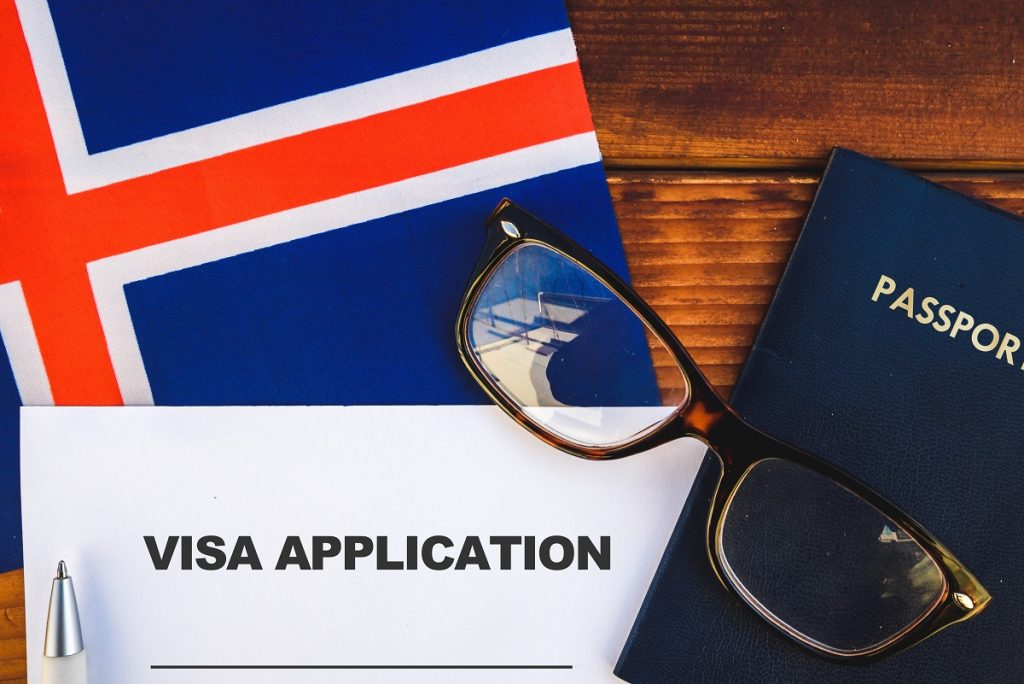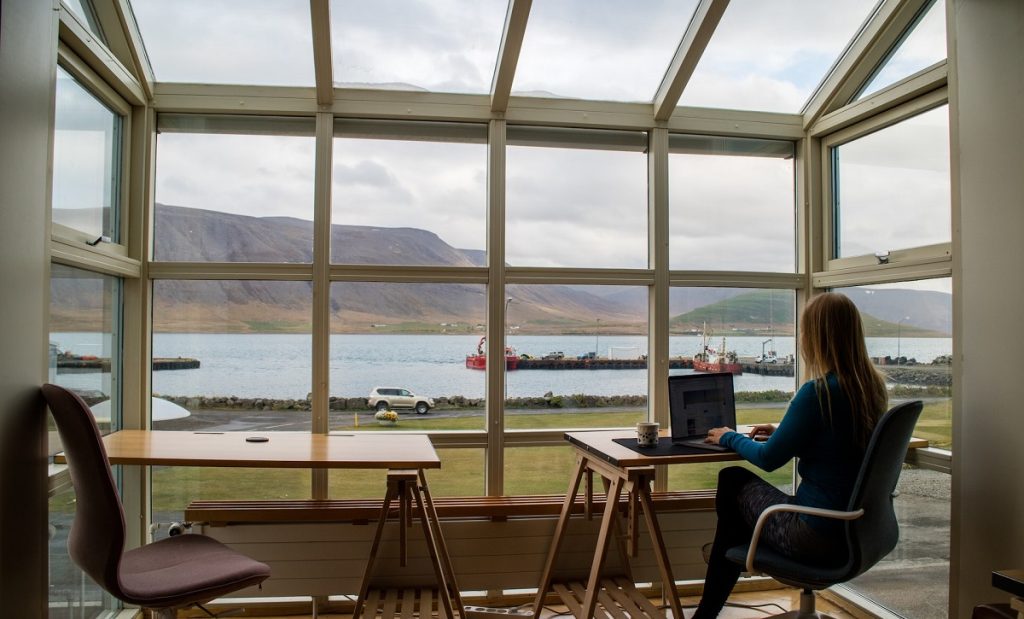Iceland is a wonderful destination for digital nomads with a love for outdoor adventures. It was one of the first countries to set up a digital nomad visa. The monthly income requirements for remote workers are high, but so is the cost of living in Iceland.
Whether you’re a self-employed worker or a foreign company employee working remotely, you might be drawn to the beautiful natural wonders of Iceland like the Aurora Borealis and the Northern Lights.
The country is also known for fast and reliable Wi-Fi available to everyone in cafés, restaurants, and well-established coworking spaces so it sounds like the perfect spot to pursue remote work.
Now you can live and work there long-term by applying for the Iceland digital nomad visa. How long does your remote-working visa last once it’s issued? What are the conditions you must meet to obtain it? What about Iceland’s general safety and public transport?
Table of Contents
Why Is Iceland A Popular Place For Digital Nomads
The natural beauty of Iceland draws nearly a half million U.S. tourists each year who come for the volcanoes, geysers, hot springs, and lava fields. Remote workers who love winter sports and a cooler climate enjoy their beautiful surroundings. Beauty aside, the country has much to recommend it for digital nomads.
Iceland is one of the safest countries to visit and move to, as it has a very low crime rate. This is said to be linked to the small population size. Crime does exist in the country, but most of it is non-violent traffic offenses. Iceland has among the lowest murder rate in European countries.
For remote workers, a stable and fast internet connection is a must. Iceland is known for great Wi-Fi availability wherever you go.
Reykjavik, the capital city of Iceland, has numerous perks and is often the digital nomads’ chosen location. Public transport is good, driving is made easier thanks to the high-quality roads, and the city is safe to walk through at night. Its beautiful natural landscapes and active nightlife scene attract all types of remote workers, regardless of their pastime preferences.

Another reason Iceland is so popular among digital nomads is tax exemption. Keep in mind that while you live and work there, you still have to pay taxes to your home country. This is particularly important to US citizens due to the Social Security system, but people from other parts of the world have to pay for their pension equivalent as well.
What Is A Remote-Working Visa?
A remote-working visa, also called a digital nomad visa, is a long-term visa that allows you to live and work remotely in a foreign country. This is a temporary residence permit, so you don’t have to apply for citizenship during your extended stay.
Can You Live In Iceland And Work Remotely?
According to the Directorate of Immigration, you can obtain a long-term 90 to 180-day visa for remote work. Your spouse or partner and children under 18 can apply for the visa with you so that you can go to Iceland as a family.
This type of visa only allows you to work remotely, so you cannot use it to work there locally if you lose your remote job or need extra money. Therefore, do your best to find a stable remote job or multiple streams of income upfront.
Does Iceland Have A Digital Nomad Visa?
Iceland has a long-term remote work visa that’s issued by the government. You cannot live and work there longer term on another visa type.

However, you can travel to Iceland and most of Europe on a different visa type. Iceland is a Schengen Area country. The Schengen countries are 27 European countries that you can visit on a Uniform Schengen visa. The Schengen Zone is comprised of the following countries:
SCHENGEN COUNTRIES
| Austria | Greece | Netherlands |
| Belgium | Hungary | Norway |
| Croatia | Iceland | Poland |
| Czech Republic | Italy | Portugal |
| Denmark | Latvia | Slovakia |
| Estonia | Liechtenstein | Slovenia |
| Finland | Lithuania | Spain |
| France | Luxembourg | Sweden |
| Germany | Malta | Switzerland |
The main purpose of a short-stay Schengen visa is traveling, not working. However, it is sometimes said the visa can be used for both business and pleasure. There is conflicting information online about the legality of remote working on this visa, so consult a lawyer about it to be on the safe side.
If you find out it’s legal, be cognizant of the downsides. Although digital nomads could technically use the Schengen visa to enter Iceland and work remotely during their visit, the 90-day stay within 180 consecutive days is an inconvenient rule.

Many remote workers may be looking to stay in the country for an extended period and return without such limitations. Plus, if you’re traveling with family members, having such short stays and always looking for the next place may be unsustainable for families with children.
Which EU Countries Offer Digital Nomad Visas?
Even though Iceland is not in the EU, it is connected to the Union by the Agreement on the European Economic Area (EEA). Similarly to the Iceland digital nomad visa, the following EU countries also offer digital nomad visas:
EU COUNTRIES
| Croatia | Greece | Netherlands |
| Cyprus | Hungary | Portugal |
| Estonia | Italy | Romania |
| Czech Republic | Latvia | Svalbard, Norway |
| Germany | Malta |
Other countries may welcome remote workers but do not have digital nomad visa in place.
Who Qualifies For Digital Nomad Visa?
Self-employed business owners and remote workers of foreign companies are eligible for a digital nomad visa. To qualify for the visa, you need to be of legal age, have a certain monthly income, and have a flexible remote job that can be done from various locations. Specific requirements vary by country.
What Are The Requirements For A Digital Nomad Visa?
The digital nomad visa application process is straightforward — after filling out a digital nomad visa application form and submitting it at your local or nearest visa office (embassy or consulate), you will have a visa interview there. Then, collect and submit other required documents and pay the application fee.
Depending on the country, there can be a difference in requirements, but the basic required documents are:
- A properly completed digital nomad visa application form
- A valid passport that doesn’t expire within six months
- Civil documents
- ID photos
- Health insurance documentation
- Remote work evidence
- Income proof
The high-income requirements of nearly $7,500 that allow remote workers to enter and remain in Iceland make the country an unaffordable choice for many digital nomads. You need to have a $ 100,000-a-year job to work here legally.

What Are The Requirements To Live In Iceland?
The conditions for living in Iceland on a digital nomad visa are:
- You are from a non-EEA/EFTA country
- You do not need a visa for the Schengen area
- You have not obtained an Icelandic long-term visa in the past 12 months
- Your intended purpose of stay is to work remotely from Iceland
- You have monthly income proof
- You do not intend to immigrate to Iceland on this visa
If you meet all of the requirements, you’ll also need to obtain the following documents for your application:
- Payment receipt for the ISK 12,200 (about 86.8 USD) processing fee per applicant, paid via bank transfer
- Passport photo (35×45 mm) not older than 6 months
- Copy of valid passport (the 6-month passport validity rule applies)
- Copy of a valid international medical insurance policy disclosing detailed health insurance information
- Proof of purpose of stay in Iceland pertaining to remote work
- Evidence of ISK 1,024,000 (around 7,518 USD) monthly salary
- Proof of ISK 1,300,000 (approximately 9,732 USD) monthly salary if you’re applying with your spouse or partner
- Marriage certificate or another document proving that you have lived with your spouse/partner for at least one year
- A clean criminal record certificate may be additionally requested by the Directorate of Immigration
How Do You Apply For A Digital Nomad Visa From Iceland?
You can apply for a digital nomad visa if you are already in Iceland, but not on a long-term visa. For example, you may be using a short-stay Schengen visa to visit the country and apply for the longer-term visa for remote workers from Iceland.
Can You Extend Your Long-term Digital Nomad Visa?
In general, digital nomads may extend a digital nomad visa if they still meet country-specific requirements. However, you cannot extend for Iceland in particular — you must wait at least 12 months before you reapply.
FAQs About Living In Iceland
Besides the amazing waterfalls, beaches, and so much more Iceland has to offer, the country has certain cons. Here are some interesting pros and cons of living in Iceland with a digital nomad visa.

| Pros | Cons |
| The scenery and the friendly people make Iceland memorable. | Iceland was the third most expensive place in the world to live in 2020 and continues to have a high cost of living index. |
| The local cuisine is all about seafood specialties, so there are a lot of new dishes you can try. | On the flip side, high-quality fresh fruits and vegetables are scarce and may be expensive. |
| Many local people speak English. | The Icelandic language is difficult to learn. |
| Iceland increasingly uses electric cars and geothermal energy and is characterized by clean air. | Public transport is costly and slow |
| Iceland is great for winter sports | Winters are long and weather conditions tend to be drastic. |
| The country has a comprehensive public healthcare system that ex-pats can access by having required insurance. | Cost of prescriptions is high. |
| The volcanoes, glaciers, ice caves, and beaches are among the natural wonders of the world. | Numerous active volcanoes increase the chance of volcanic eruptions, avalanches, and other natural hazards. |


